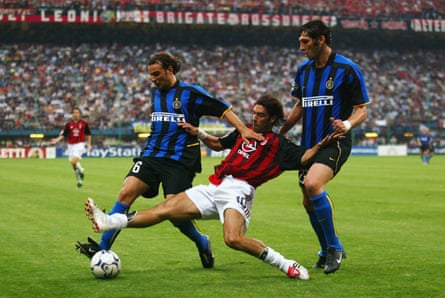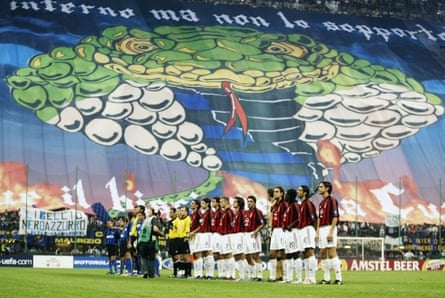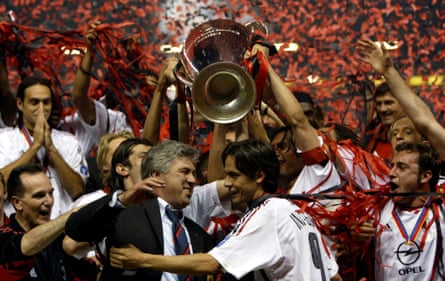The odds are stacked against Milan going into the second leg of their Champions League semi-final against their city rivals. Two early goals from Edin Dzeko and Henrikh Mkhitaryan mean Inter have one foot in the final and, truth be told, they could have been out of sight in the first leg. Milan need an early goal on Tuesday night, so who better to speak to than the last player to score for Milan against Inter in a Champions League semi-final?
Andriy Shevchenko played a vital role when Milan beat Inter on away goals in the semi-finals 20 years ago. “I remember everything about it,” says Shevchenko, who received a clever pass from Clarence Seedorf just inside the penalty box as half-time loomed in the second leg with the tie still goalless. “It was a very important moment. The emotions were incredible and that’s why it’s impossible to forget: the pass from Clarence, the goal, the jubilation, the emotion, my heart pounding.”
Shevchenko still had a lot to do. He squeezed past the bull-like figure of Iván Córdoba and lifted his shot over the advancing Francesco Toldo and into the net. Milan were the “away” team in the second leg and, even though Obafemi Martins equalised for Inter, Milan advanced to the final to set up the first, and so far only, all-Italian final with Juventus at Old Trafford.
It could have been very different for Shevchenko and Milan. Their previous performances in the Champions League had been disappointing and they only scraped into the first group stage by beating Czech side Slovan Liberec on away goals in a qualifier. Milan were not among the favourites, but Silvio Berlusconi and his trusty sidekick Adriano Galliani had quietly constructed what would become a legendary side. The nucleus of the last great team of the Berlusconi era had been in place for a few years, but Galliani signed Rivaldo, Seedorf and Alessandro Nesta in 2002 to complete the jigsaw.

Shevchenko believes Nesta and Seedorf made a big difference. “Sandro and Clarence were two very important arrivals, both on the field and within the locker room,” he says. “We were very strong on the pitch and people saw that. But the secret was to be strong inside the locker room as well. There was not just one leader, but there were many. And that made the difference.” Nesta formed a watertight partnership with Paolo Maldini in defence, while Seedorf played an integral role in Carlo Ancelotti’s diamond midfield alongside Andrea Pirlo and Gennaro Gattuso. Feeding Shevchenko and Pippo Inzaghi in attack was Rui Costa, with his socks low and shin pads on show.
In the final season with two group stages in the Champions League, Milan topped both of theirs, including an incredibly tight group involving Real Madrid and Borussia Dortmund. That set up a quarter-final with Ajax. After a goalless draw in Amsterdam, Inzaghi opened the scoring in the first half back in Milan, the last of his 12 goals in that season’s competition. “A great champion,” says Shevchenko of his fellow striker.
Jari Litmanen equalised for Ajax in the second half before Inzaghi turned provider – amazingly – for Shevchenko to head home. Steven Pienaar scored with just 12 minutes remaining, meaning Ronald Koeman’s young and enterprising Ajax side – containing Zlatan Ibrahimovic, Wesley Sneijder and Christian Chivu – were going through on away goals.
In stoppage time, a hopeful long ball from Maldini was headed on by Massimo Ambrosini to Inzaghi, who lofted the ball over the head of onrushing goalkeeper Bogdan Lobont and into the path of Jon Dahl Tomasson. The Dane, who was never a starter in his three years at Milan but had the knack of scoring vital goals, stabbed the ball home on the goal line to put Milan in their first semi-final since 1995.
“We never had any doubt,” says Shevchenko of the derby semi-final. Milan had beaten Inter twice in Serie A but even Shevchenko acknowledges the European games would be “different”. “Usually in Milan people talk about football, but they also talk about something else,” he says. “Leading up to the game, people talked only about football. Fans on the street would stop the players and say: ‘You have to win the derby.’ It was impossible to relax or think about anything else: only the derby existed. We played two games: one in the build-up and then on the pitch. Managing expectations was crucial.”
Looking back, the galaxy of stars on show represented the last throes of Serie A’s stardust era. Milan were so strong that Rivaldo, who had played a starring role in winning the World Cup the previous summer, spent most of the season on the bench, while Inter lined up with Hernán Crespo, Fabio Cannavaro, Javier Zanetti and Marco Materazzi, the latter of whom seemed to relish giving Shevchenko the Vinnie Jones treatment when the pair clashed.

Despite the talent on show, little of note happened in the first leg, with the stakes and tension simply too high. “Playing against Inter was always difficult,” says Shevchenko. “You were facing players like Materazzi, who, if they had to make a foul to stop you, would do it.” In one memorable moment from the second leg, Materazzi brazenly neglected the ball in a 50-50 with Shevchenko and kneed him in the groin. He did not even receive a yellow card or a talking to from referee Gilles Veissière but Shevchenko holds no grudges, saying Materazzi was always a “quality defender, who wanted to do everything to win”.
Shevchenko was the best striker in the world but he was going through an odd season. Unusually, he failed to reach double figures in Serie A, scoring just five in the league and four in the Champions League. “My season started with an injury, then slowly I recovered to take my place in the team,” he says. “After an injury it always takes a while to recover. The first part of my season wasn’t good, but in the end we won the Champions League and it was wonderful.” Shevchenko made amends the following season by rifling in 29 goals in all competitions, leading Milan to their first Scudetto in five years and winning the Ballon d’Or.

But all that lay ahead. The goal against Inter was Shevchenko’s last of the season, but he had taken Milan through to the final. The all-Italian final represented the second same-nation final in the tournament’s history. Whereas the all-Spanish final between Real Madrid and Valencia in 2000 produced three goals in 90 minutes, this one produced no goals in 120.
Often derided as the worst final in the Champions League era, the game suffered from a lack of Pavel Nedved, then at the height of his lung-bursting, Ballon d’Or-winning powers. Yet it’s not as bad as history would make out: Shevchenko had a valid goal bizarrely disallowed; Antonio Conte thumped the crossbar with a textbook diving header; Gianluigi Buffon’s save from an Inzaghi header remains one of the best seen in a final. Yes, it was a game of half-chances and the familiarity between the teams did not help, but Shevchenko was not complaining. “It was nice like that, winning against an Italian team,” he says.
The game went the distance and into penalties. David Trezeguet, Marcelo Zalayeta and Paolo Montero missed for Juve, with Dida so far off his line he could have shaken Montero’s hand. Kakha Kaladze and Seedorf missed for Milan, but Serginho and Nesta’s converted penalties meant it was down to Shevchenko.
How did he feel standing in front of Buffon as he took that crucial kick? “Only one thing went through my mind. Now we win the Champions League. I put it exactly where I wanted. It’s difficult to remember exactly everything about that final, because your concentration is so high, you live the moment, but I remember the penalty very well.” Buffon dived the wrong way, Shevchenko scored and Milan were champions of Europe for the first time in nine years.
For Shevchenko, winning the Champions League was the culmination of a “long and happy journey”. As for the current side, with only two goals scored against Inter in the last six encounters, they need a modern Shevchenko if they are to have any chance of winning the club’s eighth Champions League.

Comments (…)
Sign in or create your Guardian account to join the discussion